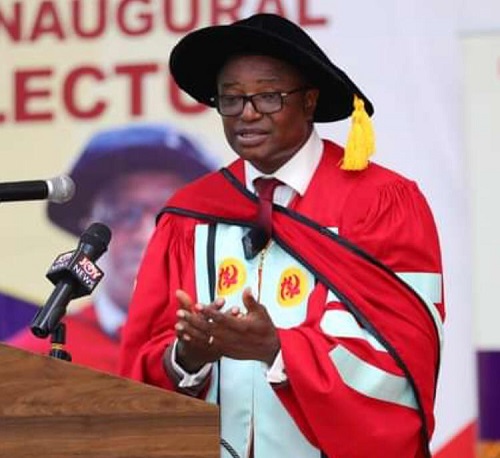
Guide youth for future relevant career - Prof Nyarko-Sampson
A professor of Guidance and Counseling, Prof Eric Nyarko-Sampson has stated that the changing and uncertain world of work require critical and conscious career guidance for the country’s youth to efficiently harness their potential for future relevance to the nation’s development agenda.
Prof Nyarko-Sampson observed that the quest for a “Ghana Beyond Aid” could serve as a catalyst for the formulation of a national strategy for career guidance and lifelong learning to help to create a pool of young people with the requisite skills and talents that match our national skills needs and development agenda, other than leaving them to go waste, or have such young people become open to societal and national vices.
Prof Nyarko-Sampson who is currently the Vice Chancellor of the University of Environment and Sustainable Development in Somanya was speaking at his inaugural lecture at the University of Cape Coast last Wednesday.
He spoke on the topic “Through the changing scenes of life:Finding a fit in the world of work.”
Prof Nyarko Sampson indicated that guidance was imperative for young people noting career guidance for young people was one of the surest ways of ensuring that the talents and abilities of the world’s teeming youth were harnessed into a productive hub for national development, whilst dealing with the issues of youth unemployment.
He said that choice of subjects or programmes in school which ultimately led to careers should be planned and done in a professional manner, and in consultation with the student.
In many instances he observed that the lack of these services in a professional more structured way had left many youth confused and unemployed.
Mandatory G and C services
Prof Nyarko-Sampson therefore called for the mandatory provision of guidance services in all schools; public and private, and at all levels, and in communities.
This he said should be backed or supported by an appropriate legislation. To ensure this, he advocated an Act of Parliament which focused solely on the provision of guidance and counselling. also call for a national policy on guidance and counselling in Ghana.
This he said would govern the practice and provision of guidance and counselling services not in only in schools but in communities as well.
Report
In Sub-Saharan Africa, the World Economic Forum’s 2018 report on the future of jobs indicate that emerging job roles in 2022 would include Software and application developers and analysts, managing directors and Chief Executives, Sales and Marketing professionals, General and Operations Managers, Financial and Investment Advisors, and assembly and factory workers.
Furthermore, the report indicated that the emerging skills would include analytical thinking and innovation, creativity, originality and initiative, active learning and learning strategies, technology design and programming, and complex problem solving.
Others he said included critical thinking and analysis, leadership and social influence, emotional intelligence, resilience, stress tolerance and flexibility.
The report further showed that nearly 50 percent of companies expect that automation would lead to some reduction in their full- time workforce by 2022, based on the job profiles of their employee base today.
However, 38 percent of businesses surveyed expected to extend their workforce to new productivity-enhancing roles, and more than a quarter expected automation to lead to creation of new roles in their enterprise.
In addition, businesses were set to expand their use of contractors doing task-specialized work, with many respondents highlighting their intention to engage workers in a more flexible manner, utilizing remote staffing beyond offices and decentralization of operations.
Prof Nyarko Sampson said the picture painted by the report called for conscientious efforts to guide our young people to make subject or programme choices that would lead to building careers which would help them compete in the international world of work in the future.
Shift
“There should be a shift by all stakeholders towards a view of guidance and counselling as a lifelong process, and the creation of structures and strategies to support the implementation of a lifelong service,” he advised.
He urged government to clarify the role of career guidance in national development by adopting a multi-sectoral approach to establish a career guidance policy framework.
Professionalise Guidance and Counseling
Again he said career guidance should be professionalized by highlighting basic professional competences needed in career guidance practice, and giving quality assurance to ensure that career services were delivered effectively.
This he noted would required specialisation in training and licensing of career guidance professionals.
Infrastructure
Additionally, he urged government and relevant institutions and organizations to provide adequate career guidance infrastructure and address existing challenges and opportunities within organizational set-ups by developing tools and services to enhance the guidance practice.
He urged scholars in universities in Ghana and Africa to undertake various research that would inform further education and practice in career guidance.
He also urged called for the recruitment of professionally trained counsellors on full-time basis in schools while institutions of training that offer counsellor education programmes should provide well-equipped counselling laboratories in order to facilitate research.
The Vice Chancellor of UCC, Prof Johnson Nyarko Boampong commended Prof Nyarko-Sampson for his contribution to the field of guidance and counseling.
